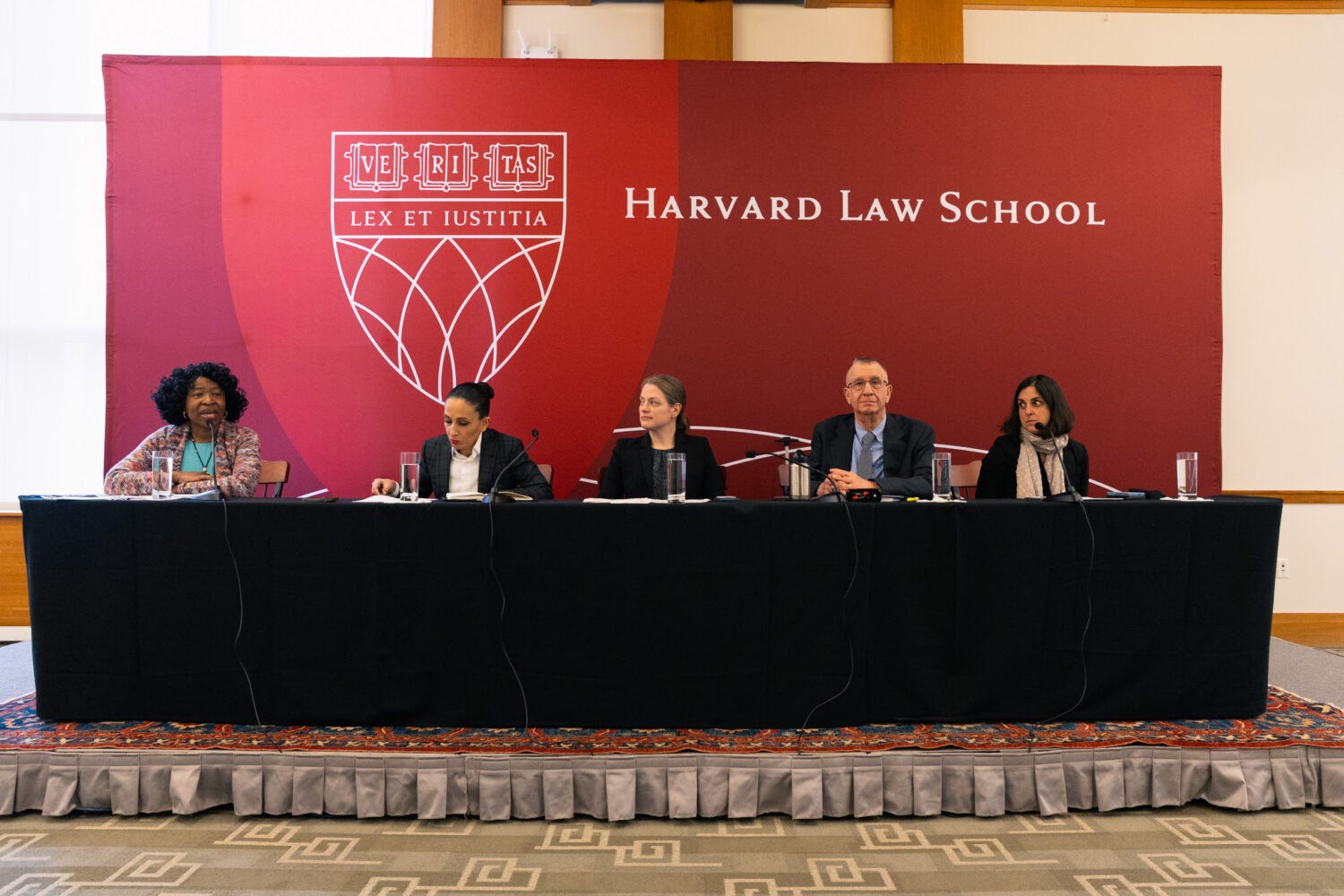The United States’ position in the world is in flux — and some of the changes could be permanent, argued experts at an event at Harvard Law School last week. While several policies are new, if not unprecedented, they said, others lean, build, or expand on those that have gone before.
The discussion, part of a series of talks at Harvard Law about the first 100 days of President Donald Trump’s second term, explored the administration’s approach to foreign affairs and immigration, including the ways in which its actions signal a turn away from the strategies that have dominated America’s relations with the international community since the end of the Second World War. But the panelists also identified ways in which the Trump administration has continued the policies of previous presidents.
“The old world order, with all the problems it had, was a stable one for a long time, and I don’t think it’s coming back,” said Kristen Eichensehr, a professor at the University of Virginia School of Law, at the discussion, which occurred before the administration’s unveiling of reciprocal tariffs on April 2. Eichensehr is also the Samuel Williston Visiting Professor of Law at Harvard.
The panel, which was moderated by Ruth Okediji LL.M. ’91 S.J.D. ’96, the Jeremiah Smith, Jr. Professor of Law at Harvard, also featured Harvard Law faculty members William Alford ’77, Sabrineh Ardalan ’02, and Naz Modirzadeh ’02.
‘Profound human stakes’
Modirzadeh, a professor of practice and founding director of the Program on International Law and Armed Conflict, began by saying that, in her view, it’s not possible yet to identify a conceptual framework that may be underlying the new administration’s policies in this area.
“I do not see a lucid Trump foreign policy toward international law, at least not 100 days in,” she said.
But Modirzadeh added that she did see a throughline in its actions so far. “There is a pattern of notable disregard of rules, restraints, alliances, and multilateral commitments.”
To Modirzadeh, one need not have wholeheartedly approved of the U.S.’ prior approaches to international law to find these moves disturbing. “You could have been highly critical of the system as it existed and still feel profound concerns, because key elements of the international legal order that are being actively dismantled, and how they are being dismantled, have profound human stakes.”
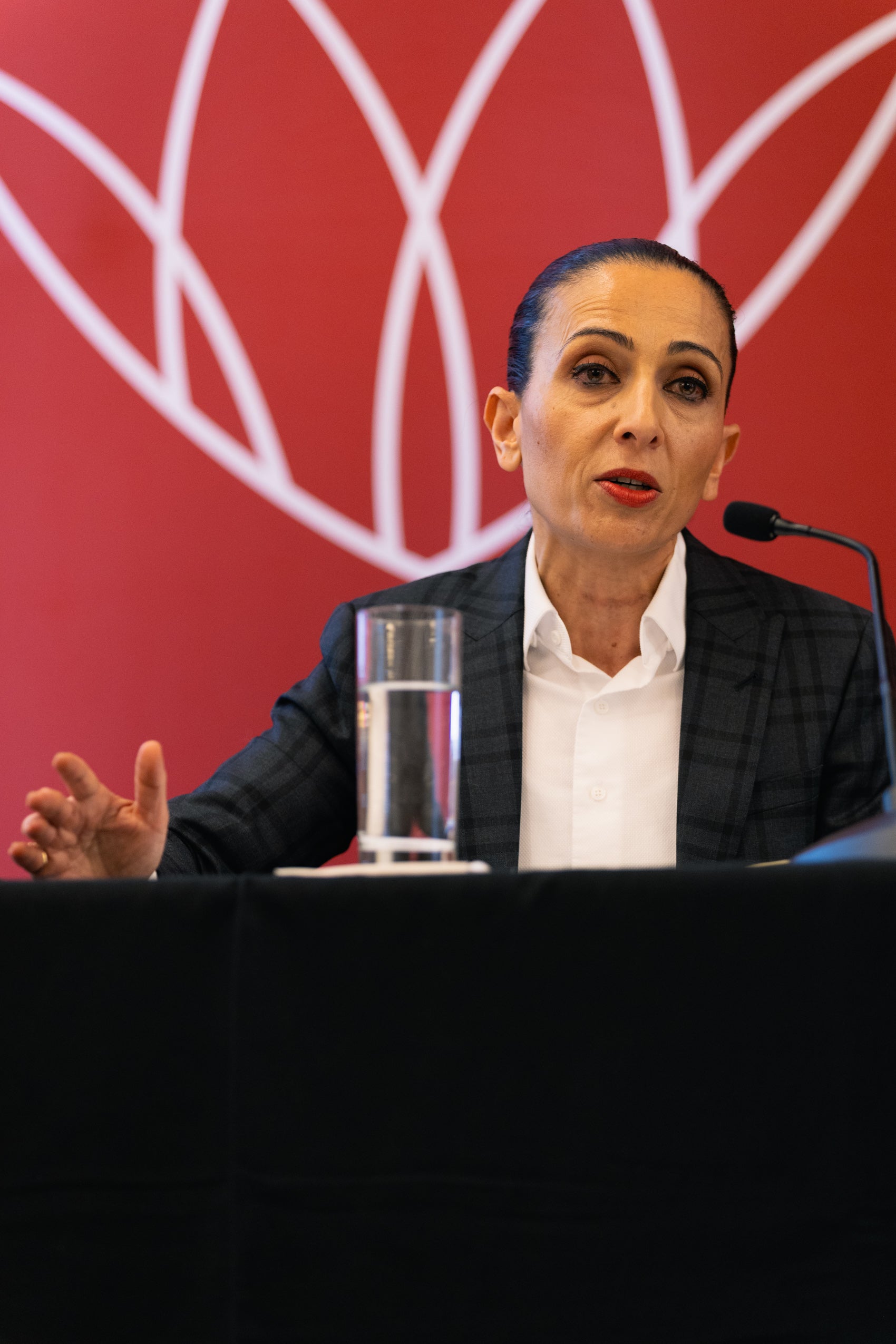
She outlined two sets of issues related to her areas of expertise about which she is particularly concerned.
The first pertains to the prohibition on the use of force in international relations, especially the illegality of territorial expansion through threats or acts of aggression.
“This is among the most settled principles in the post-World War II international legal system, and in my view, we are watching it be undermined,” she said, pointing to the Trump administration’s treatment of Russia’s large-scale re-invasion of Ukraine and the comments from the president and senior officials about Greenland, Canada, Gaza, and the Panama Canal.
The second concerns the law “restraining the conduct of hostilities” in war, which is grounded in the Geneva Conventions and customary rules.
Modirzadeh shared a refrain that she said she was hearing from diplomats around the world. “They voice a concern that we may be witnessing the intentional initiation of a kind of system-wide chaos,” she said.
‘All sticks, no carrots’
Eichensehr, of the University of Virginia School of Law, focused her remarks on what she saw as the new administration’s “disruptions” to the U.S.’ role in international engagement — but she also highlighted areas where she perceived some continuity between presidents.
She noted that President Trump had already announced the country’s withdrawal from some international agreements and institutions, such as the Paris Climate Agreement and the World Health Organization. There could be more to come, she warned.
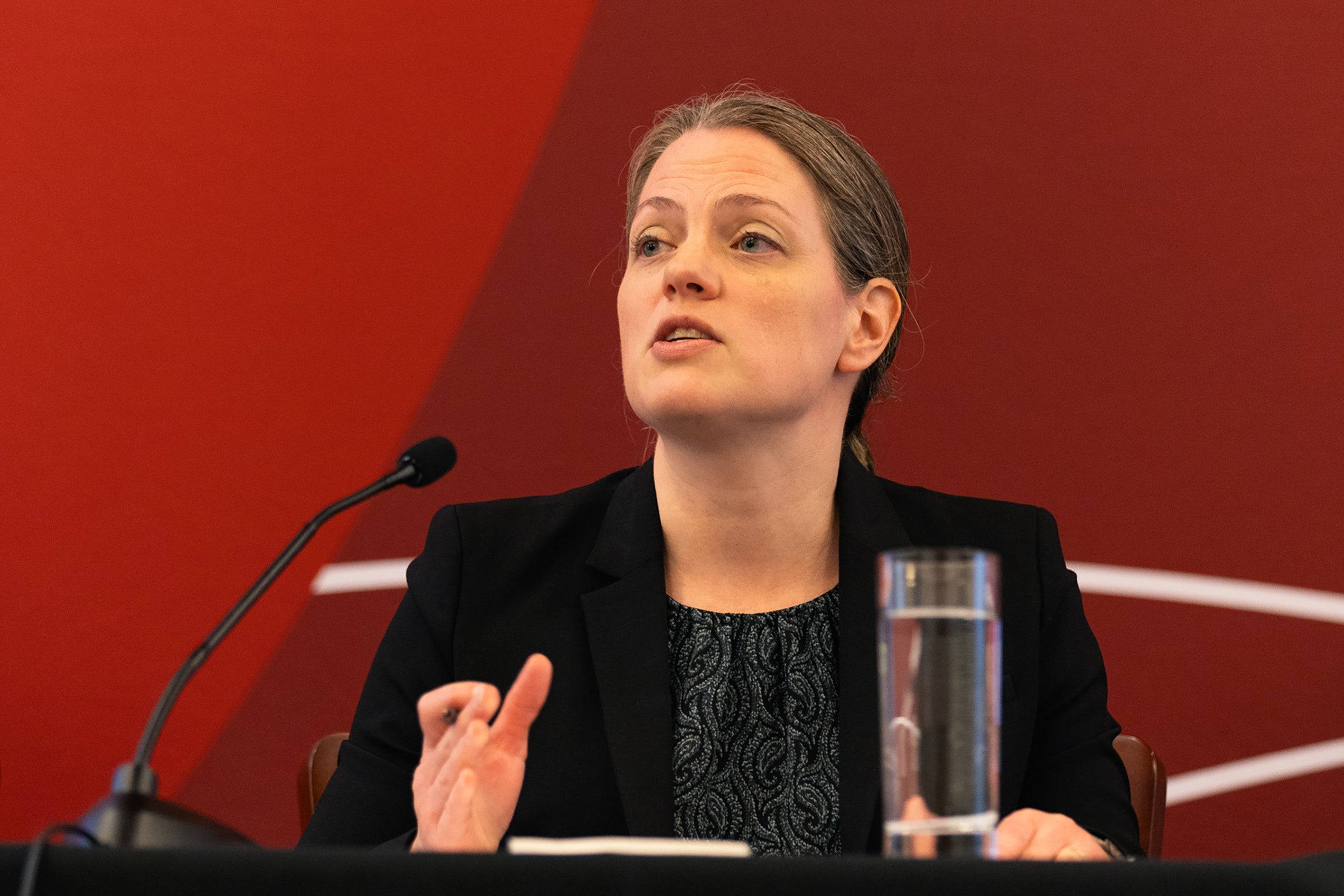
“In an executive order issued on February 4, President Trump directed the Secretary of State to conduct a review of all international intergovernmental organizations of which the United States is a member, and a review of all conventions and treaties to which the United States is a party, to determine whether any of these organizations or treaties need to be reformed, whether they serve the United States’ interests, and if not, then whether the United States should withdraw from or terminate these agreements,” she said.
Eichensehr also worried that intelligence-sharing by allies could be in jeopardy, and she expressed concern about the administration’s plan to close numerous global embassies and consulates. “With these new closures, the United States may fall very far behind [China],” in terms of the number of international outposts, she said.
But Eichensehr identified a few areas where she thought the Trump administration mirrored that of former President Biden. Both presidents have leaned heavily on economic tools such as sanctions, albeit for different aims, she argued, and both have used similar instruments against China, especially with respect to technology competition.
Where the administrations diverge, in Eichensehr’s view, is in their treatment of friendly nations. While President Biden’s cabinet seemed to believe in the importance of “acting together with allies in the service of U.S. national security,” she argued, the current administration “turns to an ‘all sticks, no carrots,’ way of interacting with the world.”
‘Ripping the veil away’
William P. Alford ‘77, the Jerome A. and Joan L. Cohen Professor of Law at Harvard, shared what he understood to be the view from China of the new administration.
Alford began by noting long-standing skepticism in the People’s Republic of China about the extent of U.S. commitment to a rules-based international order — even as the U.S. promotes such a system to other nations.
“Commentators there look at such recent developments as the new administration’s posture toward Greenland and Canada; the uncertainty about the future of NATO … ; and the announced withdrawal from World Health Organization, Paris Climate Agreement and other such entities as simply ripping the veil away and showing American hypocrisy starkly,” he said.
He next turned to the new administration’s removal or placing on leave of almost all United States Agency for International Development employees, noting the now unclear future of programs such as the President’s Emergency Program for AIDS Relief. Initiated by George W. Bush, implemented in important part via USAID, and credited with saving more than 20 million lives, PEPFAR has been the U.S.’ most prominent presence in some parts of the world. While the PRC will not likely step into this humanitarian role, Alford said. “It already has begun to reap a soft power windfall from what the U.S. has done.”
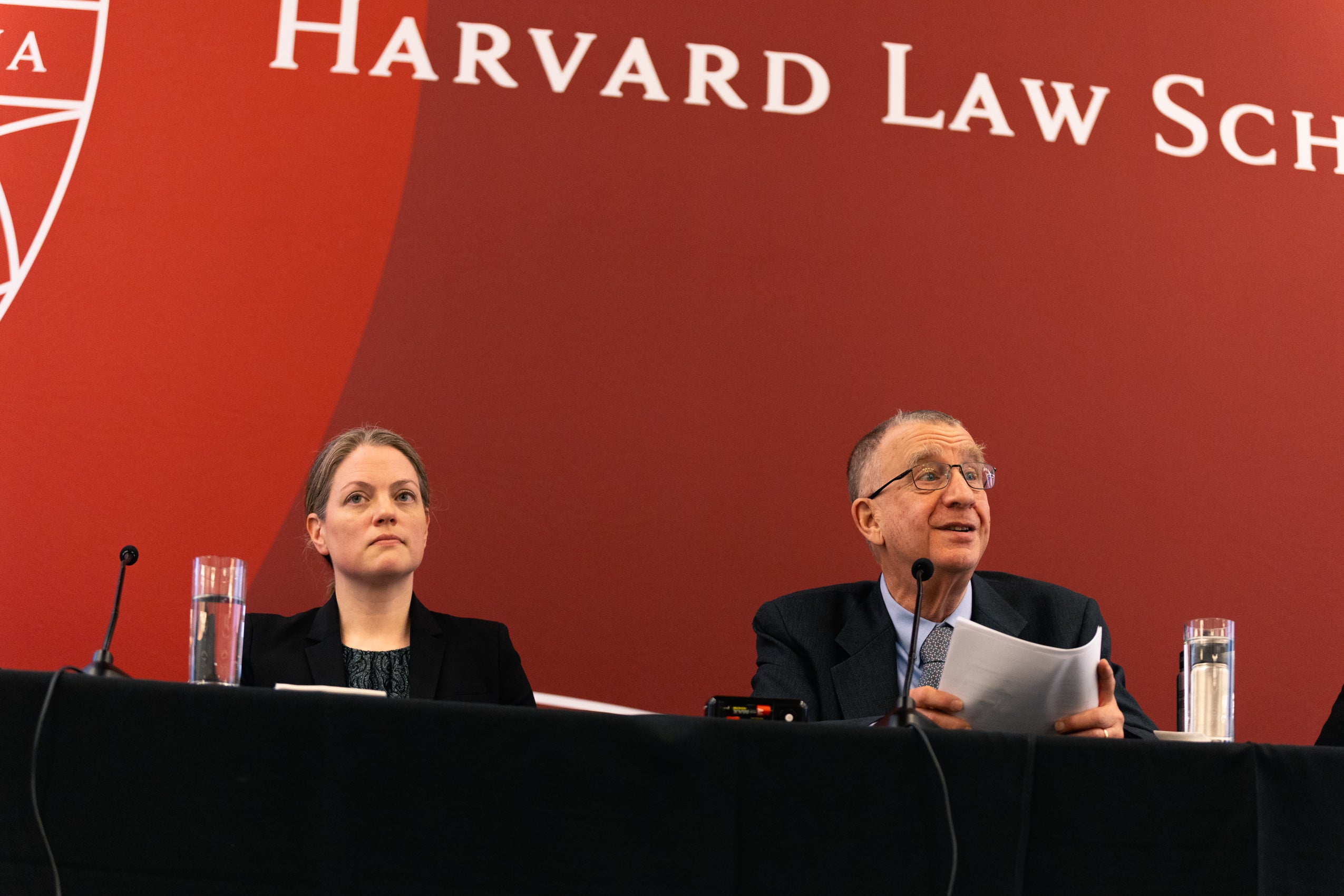
Other policies are also seen as benefitting the Chinese position, Alford continued, pointing as one example to the defunding of Radio Free Asia — which has long offered Chinese, Tibetan and Uyghur language news not otherwise available in China. And while the new administration is sharply reducing federal support for scientific and medical research, China recently committed to a 10% increase for such work, he noted.
Ultimately, the administration’s policy changes feed into a narrative among senior officials and state intellectuals in China that their nation is “in ascendancy and the U.S. … in inexorable decline,” he said. “Certainly, there are some in China … who are looking at what’s happening and saying, to the populace, ‘we told you that having … American style elections leads to turmoil…’”
‘Palpably different’
Sabrineh Ardalan, a clinical professor of law and director of the Harvard Immigration and Refugee Clinical Program, was no less sober in reviewing the administration’s actions stateside. “In my career as a lawyer who started practicing right after 9/11, I have never seen anything like the scope and intent of the Trump administration actions targeting immigrants.”
In the last few months, she said, “the administration has made or tried to make sweeping changes to the immigration system with new executive actions and policy announcements every day. The current administration’s concerted efforts to stoke fear, dehumanize, and silence immigrants, and to restrict access to the U.S., drawing on every federal resource and agency and little-known law, feels palpably different from prior administrations.”
She listed two areas where she had seen what she called “seismic” shifts in immigration policy. The first, she said, relates to asylum.
“Asylum at the southern border has been completely shut down by the Trump administration,” she said, adding that these policies have stranded thousands of people in Mexico and subjected asylum seekers to deportation. “This is despite long-established, codified U.S. obligations to provide protections to people who are fleeing persecution.”
But Ardalan also noted that these efforts “build on similar, though less expansive, restrictions by the Biden administration” to “limit the right to seek asylum.”
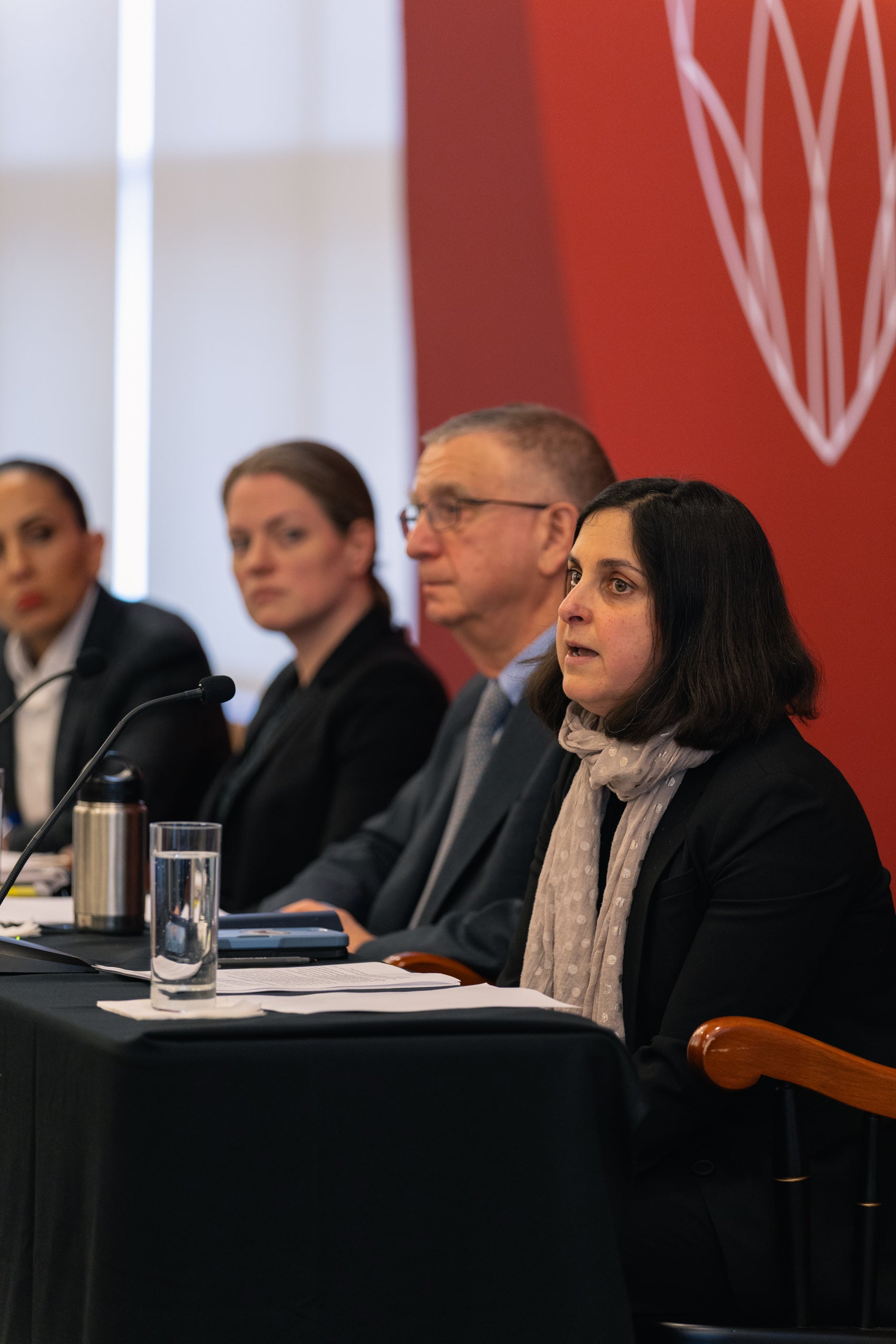
The new administration has also vastly increased its enforcement efforts within U.S. borders, Ardalan said, including the arrest and detention of large numbers of people for civil immigration violations. “We’ve seen a stripping of due process rights of immigrants with the expansion of something called ‘expedited removal,’” she explained.
Ardalan also decried the targeting of international students and scholars based on their speech, and the “unprecedented move” to invoke the Alien Enemies Act to deport hundreds of Venezuelans to a prison in El Salvador, which a judge has temporarily halted.
Okediji concluded the panel by noting that each of the speakers had identified momentous shifts in the relationship between the U.S. and the international order that emerged after World War II. But, Okediji argued, the current moment is also part of an ongoing journey – vividly set forth by the new administration – in discovering and defining what the United States is called to be as a nation, and ultimately what it means to be American.
“As our discussion has highlighted, these foreign policy events may be unprecedented in recent times, but they are not unprecedented in our national history,” she said. “In some cases, we are seeing meaningful continuity of historic patterns and decisions, and in other areas we are seeing meaningful departures from conventional wisdom and tradition.”
Okediji reminded the audience that considering the rise of new geopolitical alliances, persistent outbreaks of global conflict, and rapidly evolving technologies, the world of tomorrow is certain to look different, and they should work with compassion and integrity to help shape it for the good.
The First 100 Days of the Second Trump Presidency is a series of Harvard Law School faculty panels exploring important questions of domestic and international law raised by the administration’s initial efforts to implement its agenda.
Want to stay up to date with Harvard Law Today? Sign up for our weekly newsletter.
